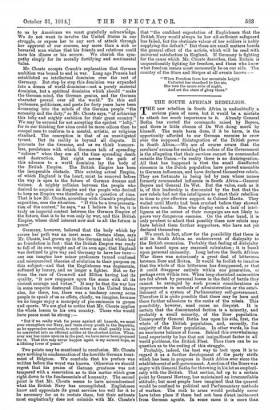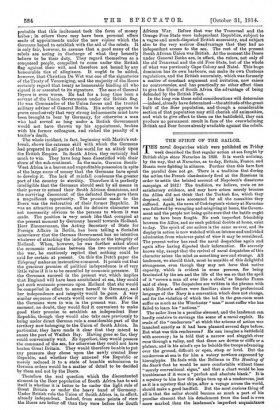THE SOUTH AFRICAN REBELLION. T HE new rebellion in South Africa
is undoubtedly a serious piece of news, but it would be a mistake to attach too much importance to it. Already General Botha has routed the commando raised by Boyers, and there is little chance of De Wet doing much by himself. The main harm done, if it be harm, is the opportunity afforded to our German enemies to crow over the supposed disintegration of the British power in South Africa.—We are of course aware that the revolters' excuse for resisting the orders of the Government is the allegation that their services cannot be commanded outside the Union.—In reality there is no disintegration. All that has happened is that the small disaffected elements in the Dutch population have proved amenable to German influences, and have declared themselves rebels. They are fortunate in being led by men whose names formerly commanded influence in South Africa—General Beyers and General De "Wet. But the value, such as it is, of this leadership is discounted by the fact that the new rebels had not the intelligence to start their rebellion in time to give effective support to Colonel Maritz. They waited until Maritz had been crushed before they showed their own bands. Men who display such a lack of intel- ligence at the outset of their campaign are not likely to prove very dangerous enemies. On the other hand, it is only prudent to admit that possibly these new rebels may have behind them further supporters, who have not yet declared themselves.
We must, in fact, allow for the possibility that there is still in South Africa an undercurrent of disloyalty to the British connexion. Probably that feeling of disloyalty is not based upon any reasoned calculation ; it is based upon personal animosity. Long before the South African War there was notoriously a great deal of bitterness between Boer and Briton. It would be foolish to ima.gine that the whole of this bitterness has disappeared, or that it could disappear entirely within one generation, or perhaps even within two. When long-cherished animosities are fed afresh by personal losses in the field of battle they cannot be assuaged by such prosaic considerations as improvements in methods of administration or the estab- lishment of a system of Parliamentary self-government.
Therefore it is quite possible that there may be here and there further adhesions to the ranks of the rebels. This possibility, however, need cause no disquiet. It is certain that the discontented faction is a minority, and probably a small minority, of the Boer population. Consequently General Botha has upon his side, first, the whole of the British population, and, secondly, the majority of the Boer population. In other words, he has an enormous balance of forces. Behind this overwhelming local superiority he has that not insignificant factor in all world problems, the British Fleet. Thus there can be no question as to the ending of this struggle. Probably, indeed, the best way to look upon it is to regard it as a further development of the party strife which has been in progress in South Africa ever since the establishment of self-government. A section of the Boers was angry with General Botha for throwing in his lot so emphati- cally with the British. That section, led up to a certain point by General Hertzog, has maintained an irreconcilable attitude; but most people here imagined that the quarrel would be confined to political and Parliamentary methods of warfare. The rush to arms would probably never have taken place if there had not been direct incitement from German agents. In some cases it is more than probable that this incitement took the form of money bribes ; in others there may have been personal offers made of appointments under the new regime which the Germans hoped to establish with the aid of the rebels. It is only fair, however, to assume that a good many of the rebels are acting in discharge of what they honestly believe to be their duty. They regard themselves as a conquered people, compelled to come under the British flag against their will, and therefore not bound by any honourable ties of allegiance. It ought to be added, however, that Christian Be Wet was one of the signatories of the Treaty of Vereeniging, and the majority of the Boers certainly regard that treaty as honourably binding all who signed it or assented to its signature. The case of General Beyers is even worse. He had for a long time been a servant of the Union Government under the British flag. lie was Commander of the Union forces and the trusted military adviser of General Botha,. His action appears to prove conclusively that very strong inducements must have been brought to bear by Germany, for otherwise a man who had served so long under a British Government would not have thrown up his appointment, broken with his former colleagues, and risked the penalty of a traitor's death.
The whole incident, in fact, beginning with Maritz's out- break, shows the extreme skill with which the Germans had prepared in all parts of the world for an attack upon the British Empire. In South Africa they certainly had much to win. They have long been dissatisfied with their share of the sub-continent. In the main, German South- West Africa is a barren and unprofitable possession in spite of the large sums of money that the Germans have spent to develop it. The lack of rainfall condemns the greater part of the country to sterility. Therefore it is perfectly intelligible that the Germans should seek by all means in their power to extend their South African dominions, and the surviving discontent of the defeated Beers gave them a magnificent opportunity. The promise made to the Boers was the restoration of their former Republic. It was an attractive promise, and its delusive character was not necessarily obvious to the persons to whom it was made. The position is very much like that occupied at the present moment by Germany herself towards Holland. Herr Zimmermann, the Acting Secretary of State for Foreign Affairs in Berlin, has been telling a Socialist interviewer that the German Government has no intention whatever of attacking the independence or the integrity of Holland. When, however, he was further asked about the economic relations between the two countries after the war, he cautiously replied that nothing could be said for certain at present. On this the Dutch paper the Telegraaf makes an instructive comment. It points out that the gracious promise of political independence is of very little value if it is to be cancelled by economic pressure. If the Germans succeed in the present war, which implies that England will have been annihilated at sea, they could put such economic pressure upon Holland that she would be compelled in effect to annex herself to Germany, and her independence and integrity would be gone. A very similar sequence of events would occur in South Africa if the Germans were to win in the present war. For the moment, no doubt, they would find it convenient to make good their promise to establish an independent Boer Republic, though they would also take care previously to bring under direct German rule a considerable part of the territory now belonging to the Union of South Africa. In particular, they have made it clear that they intend to annex the port of Walfish Bay. Having gone so far, they could conveniently wait. Ex hypothesi, they would possess the command of the sea, for otherwise they could not have beaten Great Britain. They would therefore be able to put any pressure they chose upon the newly created Boer Republic, and whether they annexed the Republic or merely reduced it to a state of humble submission to German orders would be a matter of detail to be decided by them and not by the Boers.
Therefore the real question which the discontented element in the Boer population of South Africa has to ask itself is whether it is better to be under the light rule of Great Britain or under the heavy hand of Germany. Under British rule the Union of South Africa is, in effect, already independent. Indeed, from some points of view the Boers are better off than they were before the South African War. Before that war the Transvaal and the Orange Free State were independent Republics, subject to a vague and much-disputed British suzerainty, and subject also to the very serious disadvantage that they had no independent access to the sea. The rest of the present South African Union was British. At the moment the Boers under General Botha are, in effect, the rulers, not only of the old Transvaal and the old Free State, but of the whole of what was previously Cape Colony and Natal. This huge dominion has its own harbours, can make its own Customs regulations, aud the British suzerainty, which was formerly a matter of constant argument and irritation, now raises no controversies, and has practically no other effect than to give the Union of South Africa the advantage of being defended by the British Fleet.
In the long run these solid considerations will determine —indeed, already have determined—the attitude of the great bulk of the Boer population, and though a considerable section of that population may still cherish old animosities, and wish to give effect to them on the battlefield, they can produce no permanent result in face of the overwhelming British and Boer forces already available against the rebels.



































 Previous page
Previous page